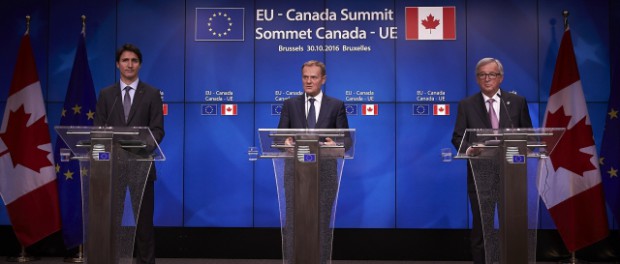The Comprehensive Economic and Trade Agreement between the EU and Canada has been signed. A day in the sun for supporters of the trade agreement, who claim it will benefit both regions, opponents however point to a number of ratification hurdles and significant concerns which may, they claim, still scupper the deal.

Yesterday – Sunday 30th October – Donald Tusk, President of the European Council, Jean-Claude Juncker, President of the European Commission, and Justin Trudeau, Prime Minister of Canada met in Brussels for the 16th EU-Canada summit. There they signed the EU-Canada Comprehensive Economic and Trade Agreement (CETA) and the Strategic Partnership Agreement (SPA) and issued a joint declaration on the EU-Canada partnership.
The summit, planned for Thursday, was delayed due to a veto by the Wallonia parliament in Belgium. Much pressure had been applied to the Walloon administration in recent days. Full details are as of yet still unclear regarding what exactly was altered to enable the Walloon authorities to accept CETA, but it appears that one of the main changes is European Count of Justice oversight of the controversial CETA Investment Court. How exactly this will play out remains to be seen, and may be dependent on other decisions, such as that of the European Court of Justice on the Singapore agreement.
Euractiv reports that CETA “is expected to boost the EU economy by €12bn a year and Canada’s by C$12bn (€8.5 billion).” It adds “the European Commission reckons that Canada will eliminate duties worth €400 million for goods originating in the EU, as of the first day of its implementation, and the figure is supposed to rise to more than €500 million after the transitional period.”
Opponents of CETA disagree. Greenpeace point out that “an independent study found that CETA could cause the loss of 200,000 jobs across the EU, while the European Commission’s own assessment predicted a tiny impact on GDP: a 0.02 to 0.03 per cent long-term GDP increase for the EU, and a 0.18 to 0.36 per cent increase for Canada.”
Greenpeace EU trade policy adviser Shira Stanton, says “this agreement will probably not survive the democratic and legal scrutiny of the ratification process over the coming months.”
Greenpeace adds “CETA – the EU-Canada agreement on investor rights, regulatory cooperation, and trade – will soon face a vote in the European Parliament and then ratification by the parliaments of all 28 EU countries. The legality of a controversial system that allows multinational corporations to sue states under CETA – known as the Investment Court System or ICS – will also be the subject of a ruling by the European Court of Justice, and by the German constitutional court. Failure to stand up to this legal scrutiny will cause the annulment of CETA.”
UN Human Rights Office of the High Commissioner has concerns too. Alfred de Zayas, the UN Independent Expert on the promotion of a democratic and equitable international order.
“The danger of CETA and TTIP being signed and one day entering into force is so serious that every stakeholder, especially parliamentarians from EU Member States, should now be given the opportunity to articulate the pros and cons. The corporate-driven agenda gravely endangers labour, health and other social legislation, and there is no justification to fast-track it” de Zayas said.
“Civil society should demand referendums on the approval of CETA or any other such mega-treaty that has been negotiated behind closed doors,” he added.
He describes CETA’s Investment Court System (ICS) as being “incompatible with the International Covenant on Civil and Political Rights, which requires legal cases to be heard by transparent, accountable, independent public tribunals”. De Zayas notes that “the associations of German and Spanish judges have already decried this kind of investor-State dispute settlement, which is a one-way street, and also discriminates against domestic enterprises, Moreover, ICS is not necessary when all participating States are parties to the ICCPR and already have public courts that are independent, transparent and accountable”.
He is thus calling for the Investment Chapter 8 of the agreement, which deals with ICS, to be dropped and that citizens demand a referendum on any decision by a Member State to sign the agreement when it comes to each country to ratify it.
Concerns have also been expressed about the ratification process, in particular and the so called zombie clause in CETA. This refers to the fact that even if a party withdraws from the agreement, the ICS element applies for a further 20 years.
More
The Zombie ISDS (CEO)





